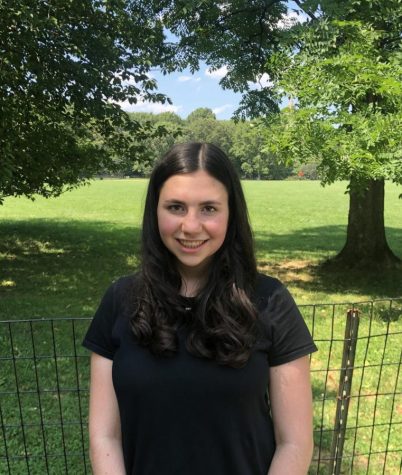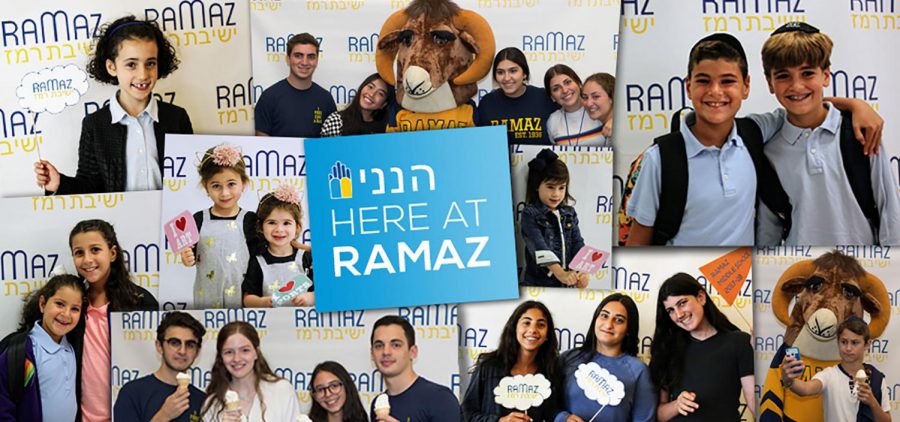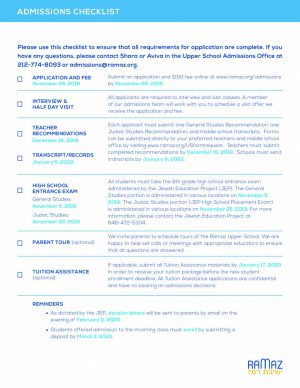Behind the Scenes of the Ramaz Admissions Process
All students remember the day they were accepted to Ramaz, excited and ready for a full, untarnished high school experience ahead of us. However, the process of getting into Ramaz has changed over the years. Director of Upper School Admissions Shaara Lipson and Assistant Director of Admissions Aviva Lieber explained that next year’s freshmen who are currently going through the process have experienced significant changes in Ramaz admissions that have affected how Ramaz crafts its upcoming class.
When an eighth-grader from outside the Ramaz community is interested in applying to Ramaz, he or she receives a mailing invite to the Ramaz Upper School Open House or can sign up online. After the Open House, students and parents can go onto the Ramaz website and apply. The application consists of contact information, an application fee, and having the parents write a short paragraph about their child. There is no student essay involved. According to Ms. Lieber, this is because students often overthink the essay, or parents write it for the students.
Once a student applies, the admission office emails them with a visiting day. They schedule a day together that the student can miss middle school. The visiting day has changed throughout the past three years since Ms. Lipson became the Director of Admissions. Now, both the visit and interview with a teacher occur on the same day. “This is to give students the best possible experience at Ramaz,” said Ms. Lipson. The interview is two periods long, and the prospective student usually visits three classes.
During the interview, prospective students meet with both a secular-studies and a Judaic-studies teacher. “This is just a conversation to get to know the kid,” explains Ms. Lieber. Every teacher asks about their own subject. For example, an English teacher would ask a student about the book they are reading in school and a science teacher would ask about the child’s science education. The interviewer also promotes Ramaz by relating the child’s talents to the school. If the child plays guitar, the interviewer would steer the conversation towards the guitar ensemble and the dinner performance. The Judaic teacher asks the prospective student to read from the Chumash as well as a Rashi. “It doesn’t matter what academic level a child is at, every single kid is treated the same exact way,” said Ms. Lieber. The teachers are chosen to interview based on their availability and their time at Ramaz.
The students then write an essay answering an open-ended question, like an essay promoting their favorite book or proposing a new invention. “This essay is really personal and about the student. We learn so many interesting things from students’ writing,” Ms. Lieber said. Additionally, applicants must write a paragraph in Hebrew as it is a requirement that all Ramaz students can write in Hebrew.
Students spend half their day with a freshman buddy. This buddy shows them around classes and allows the prospective student to experience a “real Ramaz experience.” There are no mock classes; instead, applicants have the opportunity to hear from real Ramaz teachers and students. Ms. Lieber generally tries to avoid world language classes and gym, as putting a student in a class taught in a foreign language or one that requires personal connections with ready-made friends can be an awkward experience for a visitor.
Ms. Lieber works meticulously to try and pair each applicant up with a buddy that suits them. Ms. Lieber’s biggest resource is the freshman grade dean, Dr. Aharon. “Dr. Aharon knows the kids on a personal level and knows their personalities,” Ms. Lieber said. Ms. Lieber also attends Freshman Shabbaton to get to know students. Ms. Lieber further explained that after spending time with students on their visits, she gets to know them pretty well, so she even remembers each child’s personality for the next year’s buddies.
The process for the students applying from Ramaz Middle School is more complicated. To start, Ramaz Middle School students are not interviewed. While other Jewish schools require their respective middle-school students to interview in order to apply to the high school, Ramaz does not. “It is very difficult to turn down a Ramaz family,” said Ms. Lipson. In the past, Ramaz students would visit the school with buddies for the opportunity to tour the high school. This system was changed three years ago: Ramaz Middle School students now visit the school and receive a schedule but do not have a buddy. Ms. Lieber explained that this change was made primarily due to the disruption caused by the overload of buddies. With half the eighth grade sitting in on half of the ninth grade’s classes, the disruption inhibited both grades from learning productively. Moreover, there was no proper time for middle schoolers to visit the school with buddies: freshmen are not settled into school in October, so they cannot show students around, and if middle school students are invited to the high school in February, parents are offended. The office’s solution is to invite middle school students to the high school earlier in the year, but not buddy them up with high school students. Additionally, Ramaz sends high school teachers to the middle school to get to know Ramaz eighth graders. “This is not an official interview, but we don’t want Ramaz students to miss out on the opportunity to meet with high school teachers and get to know the Upper School,” said Ms. Lieber.
On average, ten percent of Ramaz Middle School students leave Ramaz before high school. Last year, however, fourteen percent of the grade left. Half of these students went on to secular high schools. According to Ms. Lipson, this was not because of the [Ramaz] admission process. “The large percent of Ramaz students who left has nothing to do with their opinion of the high school. The problems [and reasons that they left] came way before,” she said.
Ramaz students sometimes believe that the Open House and visit days do not accurately portray a day at Ramaz. The admissions office wholeheartedly disagrees, responding, “We try to represent Ramaz fairly and honestly. We do put our best foot forward.” There are three primary and competing co-ed Modern Orthodox high schools in the New York/New Jersey area (Ramaz, SAR, and Frisch), so the admissions office feels that their honesty is especially essential. “To lie means to get kids who are unhappy. They don’t want to be here and we don’t want to convince them to be here if they don’t want to.”
“I have grown up here, and I know all different types of Ramaz students,” said Ms. Lieber. “Not all students need to be A students in honors classes, but they need to behave and we need to have a class the child can excel in.” The Ramaz admissions office also aims for diversity. There are no quotas based on prospective students’ past middle school or ethnicity. “We spend hours and get to know each and every student. We want an authentic student body of people who really want to be here.”

Rebecca Massel has been a journalist since lower school and is excited to be an editor-in-chief of The Rampage. She has been an active writer for the paper...




